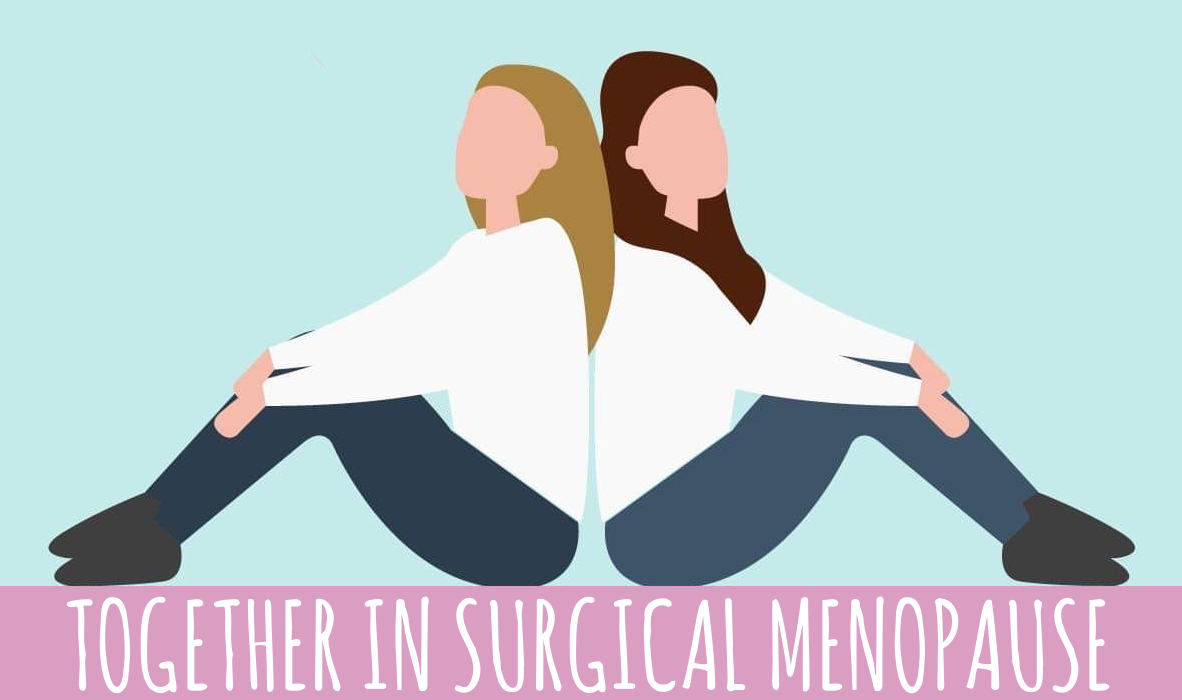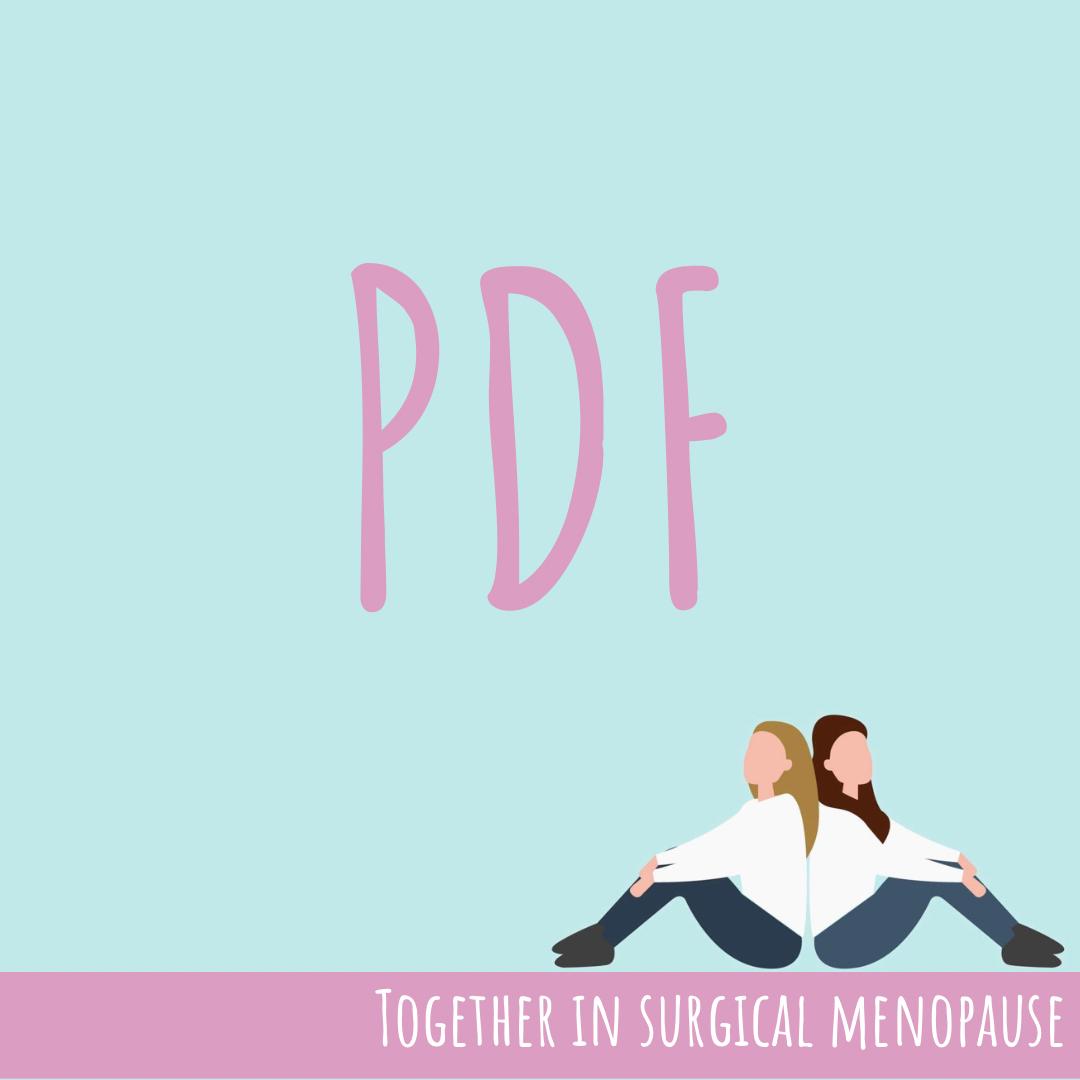

Join us as we chat with the lovely Dr Hannah Short. Hannah is a GP and accredited Specialist in Menopause & Premenstrual Disorders.
Surgical menopause occurs following the removal of both ovaries (in a procedure known as a bilateral oophorectomy [BO]). In many cases a hysterectomy (removal of the womb) and bilateral salpingectomy (removal of both fallopian tubes) is also performed; however, it is the removal of the ovaries that is key.
The surgical removal of the ovaries leads to a rapid drop off in ovarian hormones (oestrogen, progesterone and testosterone) and results in an immediate menopausal (low) hormonal state.
Surgical menopause is permanent, and is a form of iatrogenic menopause (menopause that comes about as a result of medical/surgical treatment).
It is a common misconception that if you are in surgical menopause you will, at some point, “get through it” or “come through the other side”. However, if you are in surgical menopause you will always be in surgical menopause; it is a permanent state.
Having said that, symptom duration is very individual, much as it is with a more natural menopausal transition. The vast majority of women will experience symptoms of oestrogen deficiency almost immediately following surgery, but the severity and duration will vary and will depend on age and the reasons for oophorectomy (amongst other things). Surgical menopause is a chronic condition and for many women symptoms will be life-long (although not necessarily at the same intensity).
Surgical menopause results in the sudden removal of ovarian hormones; symptoms can be experienced within hours. However, in some cases symptoms can come on more gradually (and, in a minority, not at all). As with symptom duration, this may depend on the age of the woman, the reasons for surgery and whether or not hormone replacement therapy (HRT) is used before, and immediately following, the procedure.
A unilateral oophorectomy will not result in surgical menopause. In the vast majority of cases, women will go through a natural menopausal transition and the surgery will not affect this.
However, if the remaining ovary is damaged during surgery or the blood flow to this ovary is affected (e.g. following a hysterectomy) then menopausal symptoms may still be experienced earlier, and more suddenly, than would otherwise have been expected.
There are no arbitrary time or age limits when it comes to taking HRT, whether women are in surgical or natural menopause. The 2015 NICE guidelines (NG23) and British Menopause Society (BMS) recommendations are quite clear about this. The decision to use HRT is very individual and should be made after a fully informed discussion with a doctor knowledgeable in this area. As long as the benefits of HRT use outweigh any risks, HRT can be continued. This can be life-long.
The short answer is: yes, in most cases. However, if there is a history of severe or widespread endometriosis then a progestogen may also be needed, to reduce the risk of stimulating any remaining deposits, even if a hysterectomy has been performed. Please note, all women require a progestogen as part of HRT if they have not had a hysterectomy.
Women’s Health Concern (the patient arm of the BMS) has a helpful factsheet on this: https://www.womens-health-concern.org/help-and-advice/factsheets/induced-menopause-in-women-with-endometriosis/
This will depend on the type of cancer in question. Cervical, vulval and vaginal cancer are not hormone dependent, so systemic and topical (local) HRT can safely be prescribed.
Breast cancer is considered a contraindication to systemic HRT use (meaning its prescription is not recommended); however, in some cases it can be considered in joint discussion with the woman’s oncology team. Evidence suggests that HRT can be considered in patients with a history of early stage endometrial (womb) cancer and that survival rates are not affected in women with epithelial ovarian cancer. Specialist management is always required.
Testosterone is an important female hormone and there is a sharp drop off in levels following surgical menopause. Testosterone replacement therapy (TRT) can help improve energy, concentration, mood, sex drive (libido) and general well-being. There is also evidence that it may be beneficial for women who suffer with migraine following removal of the ovaries. Having said that, unfortunately, not all women find benefit from TRT, even if blood tests show that their levels are low following surgery. Adequate oestrogen replacement and a 3-6 month trial of TRT is usually recommended to assess effect.
More information can be found here: https://www.womens-health-concern.org/help-and-advice/factsheets/testosterone-for-women/
Yes, but it is not licensed for use by women in the UK. As a result, many doctors do not feel comfortable prescribing it as they are unfamiliar with doing so. Furthermore, in some areas there can be restrictions on prescribing. Referral to, or advice from, a menopause specialist may be required before TRT can be started.
See here: https://www.womens-health-concern.org/help-and-advice/factsheets/testosterone-for-women/
All women who are in surgical menopause should have the option of being referred to a doctor with specialist knowledge in this area. Some GPs do have the requisite knowledge and training and, therefore, can advise women in the primary care (GP) setting. However, many women will require referral to (or, at the very least, written advice and guidance from) a menopause specialist in secondary care.
For those unable to safely take HRT, and especially those below the age of 45, specialist input is paramount. Alternatives to HRT should be offered and discussed: https://www.womens-health-concern.org/help-and-advice/factsheets/complementaryalternative-therapies-menopausal-women/
A holistic and individualised approach is required for all women in surgical menopause, whether or not HRT is used. Dietary and lifestyle measures are of great importance, both in terms of symptom control and in terms of protecting long-term health.
Key things include:
Not smoking (and seeking advice/support to help stop for those who currently do). Smoking increases the risk of osteoporosis, heart disease and dementia and can worsen menopausal symptoms.
Limiting alcohol intake to fewer than 7 units a week (around 2/3 bottle of wine) and no more than 2 units (~ 1 medium glass of wine) on any occasion. Intake of more than 7 units a week is associated with impaired brain function/cognition in later life.
Centring diet around plant-based whole foods (e.g. fruits, vegetables, wholegrains, beans, legumes, nuts & seeds) to ensure adequate intake of fibre, micronutrients and prebiotics. Evidence suggests that women who follow a plant-based diet exhibit fewer menopausal symptoms; they also have lower rates of cancer, heart disease and diabetes.
Focussing on non-dairy sources of calcium e.g. leafy greens, almonds, beans, tofu https://www.hsph.harvard.edu/nutritionsource/what-should-you-eat/calcium-and-milk/. Contrary to popular belief, dairy intake should be limited to ~ 1 serving/day for optimum bone health.
Including regular sources of phyto-oestrogens in the diet (e.g. soya [tofu, tempeh, miso, edamame beans, soya milk], chickpeas, lentils, flaxseeds, sesame seeds). Phyto-oestrogens may improve menopausal symptoms and can have a positive effect on bone and heart health, with no negative effect on cells in the breasts or uterus (womb). In fact, regular soya ingestion may even reduce the risk of breast cancer (including recurrence): https://www.cancer.org/latest-news/soy-and-cancer-risk-our-experts-advice.html
Vitamin D3 supplementation: 1000-2000iu/day. This is especially important during the darker months (Oct-Mar).
Regular weight-bearing exercise (3-5 times/week) to maintain/build bone and muscle strength e.g. weight/resistance training, brisk walking/running, tennis, dance.
Practising Yoga, Pilates and/or Tai Chi; this can be very helpful in improving balance, core strength and posture, which becomes increasingly important to reduce the risk of falls (and, therefore, fractures) as women age.
Stress-reduction, relaxation and self-care. This is important for everyone. Consider a regular mindfulness/meditation practice, take time out in nature, or begin a new, creative hobby. Above all be kind to yourself.
A bone density (DEXA) scan is recommended for all women who have had a early menopause (below the age of 45), whether or not they are in surgical menopause. A baseline DEXA scan would also be recommended for older women who had an early menopause and did not/could not take HRT.
If bone density is shown to be normal, and oestrogen replacement is started, then there is thought to be little-no benefit in repeating the scan. However, if bone density is lower than expected (i.e. the scan shows osteopenia or osteoporosis), the scan may need to be repeated at 2-5 years (this will depend on individual circumstances and, to some extent, local guidelines).
A history of Premenstrual Dysphoric Disorder (PMDD) means that there is an inherent sensitivity to hormone fluctuations (the brain has an abnormal, and exaggerated, response to normal hormonal changes). Following surgical menopause, the main trigger for PMDD (the menstrual cycle) has been removed; however, this sensitivity remains. Studies suggest that it can take up to a month for a hormone-sensitive brain to adjust to any new hormonal change (even if that change will ultimately be positive).
More research in this area is needed. However, the key to managing this is to maintain stable hormone levels as much as possible and to aim to alter the brain’s response to any changes. A combination of careful HRT prescription, and monitoring, and dietary and lifestyle measures are needed. Psychological work/support is also likely to be beneficial to help the brain “unlearn” unhelpful responses to stress as these are often ingrained after many years. Some women may benefit from the addition of a low dose anti-depressant, which can help stabilise the neurotransmitters (e.g. serotonin) in the brain.
See: https://iapmd.org/the-first-year-post-op

Click here to download our catch up with Dr Hannah Short as a PDF
You can find out more about Hannah on her website at www.drhannahshort.co.uk
You can also follow Hannah on her social media pages:
drhannahshort